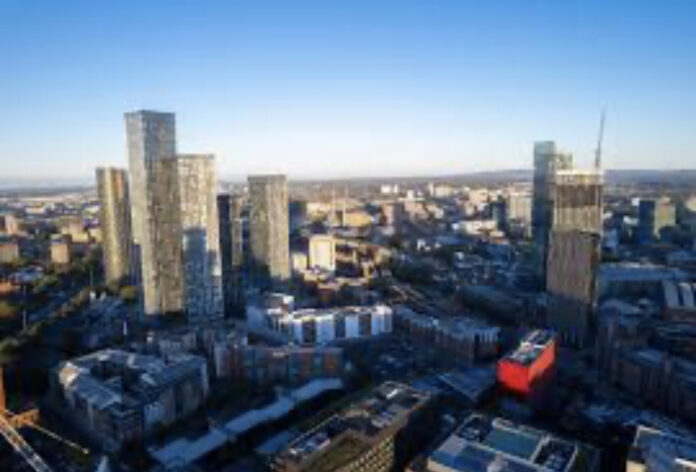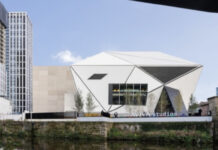The latest State of the City report, detailing Manchester’s progress in delivering its 10-year strategy, comes at a pivotal moment.
It is published as the current 2015-25 Our Manchester Strategy period concludes, and the city prepares to launch its new strategy for the next decade.
The annual State of the City report provides a snapshot of how the city has progressed and where deep-rooted challenges are being addressed.
Bev Craig, Leader of Manchester City Council, said: “This is a significant year for Manchester as we prepare to launch the new Our Manchester Strategy which will guide the city for the next decade, and reflect on the progress we have collectively made in the last 10 years.
“Our annual State of the City report enables us to chart that progress as well as the challenges that still remain.
“The report demonstrates Manchester’s dynamism as we continue to see strong population and economic growth and begin to see the impact of a raft of initiatives to tackle inequalities and ensure that everyone is included in the city’s success. That includes overseeing the building of more council, social and genuinely affordable homes than at any time in the last 15 years.
“We’re also investing in improving neighbourhoods across the city. Progress is being made. But while Manchester is now firmly established among leading European cities, and is one of the fastest growing, we are focused on taking that success to the next level – and taking all Mancunians with us.”
In 2024, Manchester’s population continued to grow, driven primarily by international migration and a rise in student numbers. This growth has had a positive impact on the city’s overall development, particularly in the city centre, which remains a central hub for economic growth, benefiting both Manchester itself and the wider region.
The demand for office space in Manchester remains robust, with 2024 expected to see record levels of leasing activity for office spaces, marking a significant milestone in the post-pandemic recovery. Additionally, the Oxford Road corridor continues to attract large-scale investments, such as the launch of City Labs 4.0 and new office and research opportunities on Upper Brook Street, alongside the approval of a strategic regeneration framework for Sister – a new innovation district and global science hub.
Manchester’s cultural, tourism, and leisure sectors have also seen a surge in visitor numbers throughout 2024. Aviva Studios and Co-op Live have quickly become key venues, drawing in crowds for major music and cultural events. At the same time, investment in the city’s district centres, supported by Government funding secured by the Council has led to noticeable progress, particularly in areas like Wythenshawe, Gorton, Moston and Withington with impetus to expand this to high streets across the city.
A Highly Skilled City
As Manchester’s population continues to grow, the city’s workforce has also expanded, with 426,000 people in employment. Most schools in the city are now rated as good or outstanding. Additionally, more young people are pursuing post-16 education, with an increase in capacity at various colleges and schools, although this remains an ongoing challenge.
Manchester continues to attract and retain a large number of graduates, which contributes to the city’s thriving workforce. Economic growth has been fueled by the rise of highly skilled jobs in industries such as digital technology, biotechnology, and advanced materials.
However, there are still significant levels of economic inactivity, particularly due to poor health. To address this, a variety of programs have been introduced to help individuals access employment opportunities and improve their skills.
Targeted initiatives have focused on specific sectors and employers, with local job fairs and customised support programs being backed by various funding schemes. As part of the city’s efforts to achieve UNICEF Child Friendly City status, partnerships between schools and employers have been established.
Furthermore, Manchester has earned the designation of a UNESCO City of Lifelong Learning, a step forward in supporting adult education and lifelong learning. In addition to these efforts, significant programs are underway to create green jobs, aligning with the growing demand for sustainable employment in the economy.
A Progressive and Equitable City
Making Manchester Fairer is the city’s five-year action plan aimed at tackling health inequalities across Manchester. In 2024, key milestones included the delivery of one million meals through the Manchester Food Board Partnership and the continued support of local initiatives via the In Our Nature project, which is designed to help communities across the city.
The ongoing cost-of-living crisis has left 100,000 households with less than £30 per month in disposable income. To support these households, Manchester has provided a range of services, including free school meals, digital inclusion initiatives, a dedicated advice line, and direct financial support through a household support fund.
Homelessness remains a significant challenge, with a high number of people presenting as homeless each year. However, there has been progress, with the use of B&B accommodation for families all but eradicated, a decrease in rough sleeping, and fewer individuals in temporary accommodation.
Alongside this, a new Children and Young People’s Plan for 2024-2027 has been developed, informed by the voices of children and young people. This plan emphasises prevention and early intervention, aiming to help young people stay safe and thrive within their communities.
As part of the UNICEF Child Friendly City program, 11,000 children shared their views, and in January 2024, key priorities were established, including ensuring children are safe and secure, have a sense of place, and lead healthy lives. In addition, the city continues to prioritise addressing health inequalities through a variety of public health measures, which remain central to the “Making Manchester Fairer” initiative.
A Liveable and Zero Carbon City
The Housing Strategy 2022-2032 sets an ambitious target of constructing 36,000 homes, with at least 10,000 of those being affordable.
In its first two years, significant progress has already been made. Last year 600 affordable homes were completed with a further 1,500 on site and a further 1,450 in the pipeline – meaning Manchester is on track to meet this target.
To further support housing development, Strategic Regeneration Frameworks have been introduced in key areas across the city, including Victoria North, Grey Mare Lane, Strangeways, and Holt Town, which will see large numbers of new homes including affordable homes built. Additionally, a retrofit programme is in place, aiming to improve the energy efficiency of a third of the homes managed by the Manchester Housing Providers Partnership by 2032.
Manchester has made progress in reducing its carbon emissions, with a 5% decrease in 2022 (the latest data available). However, more work is needed to meet long-term sustainability targets. To accelerate efforts, a new framework for the period of 2025-2030 is currently under development.
Safety remains a top priority for residents, and the Manchester Community Safety Partnership has rolled out several key initiatives to address the city’s main concerns.
Meanwhile, Manchester’s parks and green spaces have seen a significant increase in activity, with a 7% rise in the number of events and activities hosted in 2024.
The launch of Always, Everywhere: the Manchester Culture Ambition in 2024 followed extensive consultation and marked a significant step forward for the city’s cultural development. The English National Opera (ENO) also announced its move to Manchester, and the completion of HOME Arches provides a new creative workspace for the city’s artists and innovators.
In the sporting realm, Manchester hosted 24 major sporting events in 2024, further solidifying its reputation as a sporting hub. Additionally, the city was named the first European Capital of Cycling, showcasing its commitment to sustainable transport and active living.
A Connected City
In collaboration with Transport for Greater Manchester (TfGM), significant road improvements are currently underway on Whitworth Street West and Deansgate. These upgrades are part of the city’s broader efforts to enhance its infrastructure and transportation network.
Manchester has also developed an ambitious plan to expand Electric Vehicle charging across the city, supporting the transition to greener transportation options. This initiative is a key part of the city’s strategy to promote sustainability and reduce carbon emissions.
The Bee Network, an integrated public transport system for Greater Manchester, continues to grow and improve. All remaining buses in the city were franchised and brought under local control, further streamlining the public transport experience for residents.
Additionally, 14 active travel schemes focused on walking and cycling are either underway or in the planning stages. These initiatives aim to promote healthier, more sustainable travel options, making it easier for residents to choose active modes of transport.







